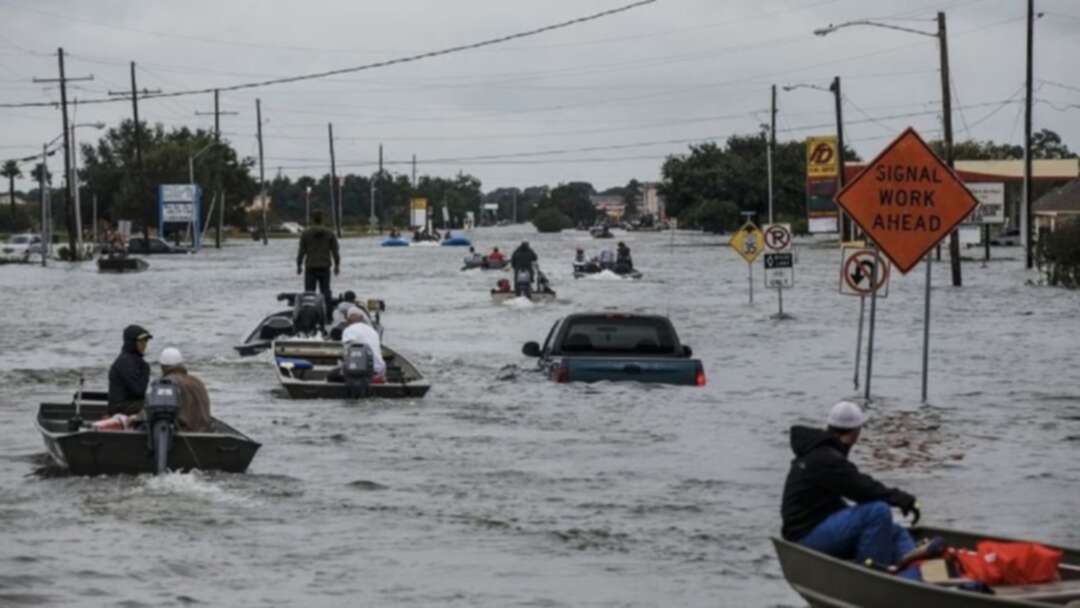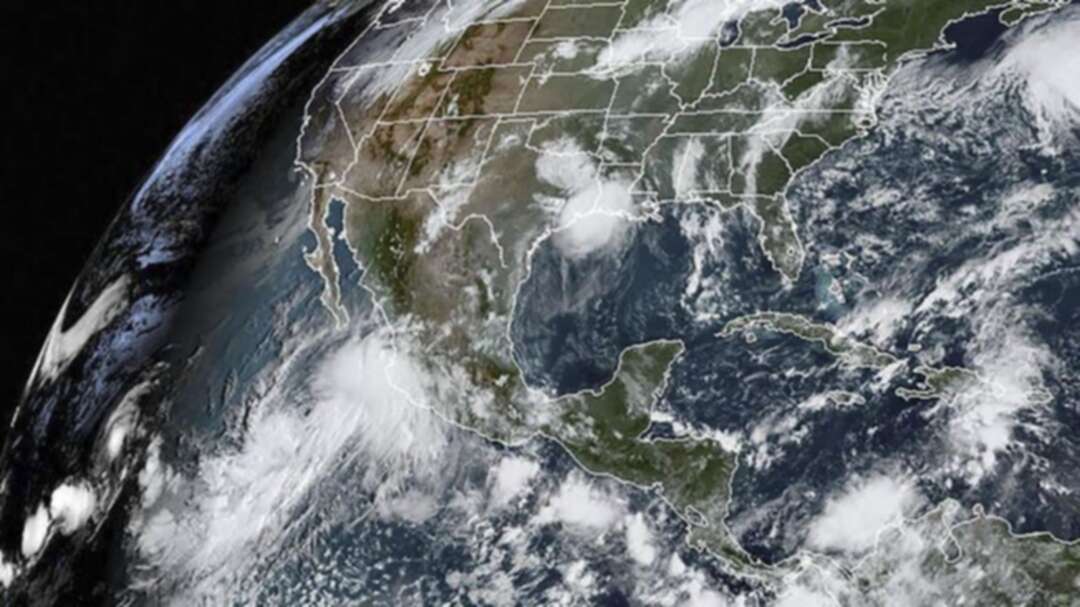-
Study shows climate change makes Hurricane Harvey more destructive

According to a new study published Thursday (August 25), 30-50 percent of residences, or up to 50,000 homes, in Texas' Harris County would not have been flooded by catastrophic Hurricane Harvey in 2017 without climate change.
Furthermore, low-income Latinos, the largest racial group in the county, which encompasses Houston, were hit disproportionately harder in the climate change-attributed flooding, the study issued by the journal Nature Communications found, the xinhua reported.
The Category 4 hurricane made landfall in southern states of Texas and Louisiana in August 2017 and stalled for more than four days, killing 68 people in Texas, 36 of them in Harris County.
It may have ruined up to 1 million vehicles along the Texas Gulf Coast and in the Houston area alone, roughly one in seven cars may have been destroyed, according to a report by local newspaper Houston Chronicle.
The hurricane caused roughly 125 billion U.S. dollars in damage, more than every natural disaster in U.S. history except Hurricane Katrina 17 years ago. Parts of the metropolitan area still have not fully recovered five years after its landfall.

"We already know that climate change is increasing the severity and frequency of extreme weather events," said the study's lead author Kevin Smiley, an assistant sociology professor at Louisiana State University (LSU).
"But now researchers are able to pinpoint the extent of damage from a specific extreme weather event such as Hurricane Harvey and the resulting floods," he was quoted as saying by a report from the ScienceDaily website based on materials provided by LSU.
Study says Arctic currently warmest in over 7,500 years
The rainfall total was 15-38 percent greater than it would have been in a world that was not warming, the researchers found, citing estimates from two researches published in 2017 and several models they created to reflect a variety of precipitation scenarios.
Even in the most conservative scenario, in which only 7 percent of the precipitation is associated with climate change, the researchers still found that nearly 13 percent of the affected buildings would not have been flooded at all in a non-warming world.
They also found that Latino households had accounted for 36 percent of residences that had not flooded at all but for 48 percent of those that had flooded because of climate change. White households accounted for 37 percent of the dry homes and 33 percent of those that had flooded due to climate change.
21 dead, around 21 missing after hurricane Agatha hits Mexico
In general, neighborhoods with higher incomes had experienced greater effects of climate-boosted flooding, but this pattern was reversed for communities with more Latino residents, where greater effects from flooding were observed in lower-income neighborhoods, the study found.
"This means that we have quantified the contribution of climate change to the suffering of people who live there," said Michael Wehner, the study's co-author and senior scientist at Lawrence Berkeley National Laboratory.
Germany braces for storm Ylenia with Hurricane-force gusts
The study is "a first of its kind investigation into potential disparities between those impacted by the climate change-induced flooding, finds patterns of racial and economic disparities", said the ScienceDaily report.
Climate change attribution, which ascertains the connection between climate change and extreme weather events, involves running computational models to estimate how much these changes in climate make extreme weather events, like hurricanes, more severe.
Source: xinhua
You May Also Like
Popular Posts
Caricature
BENEFIT AGM approves 10%...
- March 27, 2025
BENEFIT, the Kingdom’s innovator and leading company in Fintech and electronic financial transactions service, held its Annual General Meeting (AGM) at the company’s headquarters in the Seef District.
During the meeting, shareholders approved all items listed on the agenda, including the ratification of the minutes of the previous AGM held on 26 March 2024. The session reviewed and approved the Board’s Annual Report on the company’s activities and financial performance for the fiscal year ended 31 December 2024, and the shareholders expressed their satisfaction with the company’s operational and financial results during the reporting period.
The meeting also reviewed the Independent External Auditor’s Report on the company’s consolidated financial statements for the year ended 31 December 2024. Subsequently, the shareholders approved the audited financial statements for the fiscal year. Based on the Board’s recommendation, the shareholders approved the distribution of a cash dividend equivalent to 10% of the paid-up share capital.
Furthermore, the shareholders endorsed the allocation of a total amount of BD 172,500 as remuneration to the members of the Board for the year ended 31 December 2024, subject to prior clearance by related authorities.
The extension of the current composition of the Board was approved, which includes ten members and one CBB observer, for a further six-month term, expiring in September 2025, pending no objection from the CBB.
The meeting reviewed and approved the Corporate Governance Report for 2024, which affirmed the company’s full compliance with the corporate governance directives issued by the CBB and other applicable regulatory frameworks. The AGM absolved the Board Members of liability for any of their actions during the year ending on 31st December 2024, in accordance with the Commercial Companies Law.
In alignment with regulatory requirements, the session approved the reappointment of Ernst & Young (EY) as the company’s External Auditors for the fiscal year 2025, covering both the parent company and its subsidiaries—Sinnad and Bahrain FinTech Bay. The Board was authorised to determine the external auditors’ professional fees, subject to approval from the CBB, and the meeting concluded with a discussion of any additional issues as per Article (207) of the Commercial Companies Law.
Speaking on the company’s performance, Mr. Mohamed Al Bastaki, Chairman BENEFIT , stated: “In terms of the financial results for 2024, I am pleased to say that the year gone by has also been proved to be a success in delivering tangible results. Growth rate for 2024 was 19 per cent. Revenue for the year was BD 17 M (US$ 45.3 Million) and net profit was 2 Million ($ 5.3 Million).
Mr. Al Bastaki also announced that the Board had formally adopted a new three-year strategic roadmap to commence in 2025. The strategy encompasses a phased international expansion, optimisation of internal operations, enhanced revenue diversification, long-term sustainability initiatives, and the advancement of innovation and digital transformation initiatives across all service lines.
“I extend my sincere appreciation to the CBB for its continued support of BENEFIT and its pivotal role in fostering a stable and progressive regulatory environment for the Kingdom’s banking and financial sector—an environment that has significantly reinforced Bahrain’s standing as a leading financial hub in the region,” said Mr. Al Bastaki. “I would also like to thank our partner banks and valued customers for their trust, and our shareholders for their ongoing encouragement. The achievements of 2024 set a strong precedent, and I am confident they will serve as a foundation for yet another successful and impactful year ahead.”
Chief Executive of BENEFIT; Mr. Abdulwahed AlJanahi commented, “The year 2024 represented another pivotal chapter in BENEFIT ’s evolution. We achieved substantial progress in advancing our digital strategy across multiple sectors, while reinforcing our long-term commitment to the development of Bahrain’s financial services and payments landscape. Throughout the year, we remained firmly aligned with our objective of delivering measurable value to our shareholders, strategic partners, and customers. At the same time, we continued to play an active role in enabling Bahrain’s digital economy by introducing innovative solutions and service enhancements that directly address market needs and future opportunities.”
Mr. AlJanahi affirmed that BENEFIT has successfully developed a robust and well-integrated payment network that connects individuals and businesses across Bahrain, accelerating the adoption of emerging technologies in the banking and financial services sector and reinforcing Bahrain’s position as a growing fintech hub, and added, “Our achievements of the past year reflect a long-term vision to establish a resilient electronic payment infrastructure that supports the Kingdom’s digital economy. Key developments in 2024 included the implementation of central authentication for open banking via BENEFIT Pay”
Mr. AlJanahi concluded by thanking the Board for its strategic direction, the company’s staff for their continued dedication, and the Central Bank of Bahrain, member banks, and shareholders for their valuable partnership and confidence in the company’s long-term vision.
opinion
Report
ads
Newsletter
Subscribe to our mailing list to get the new updates!





















